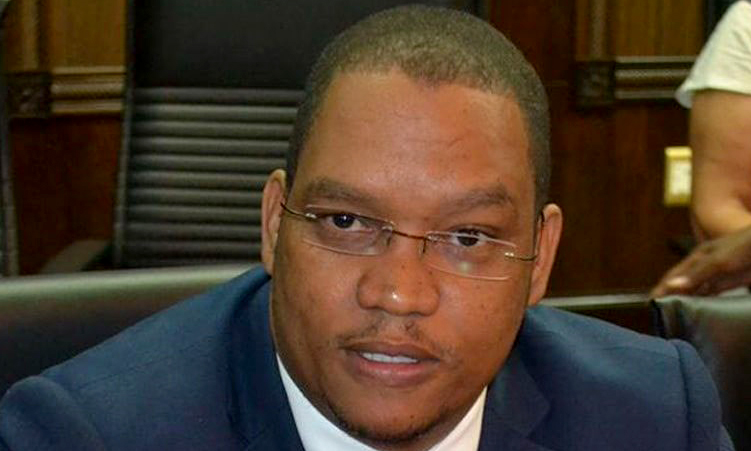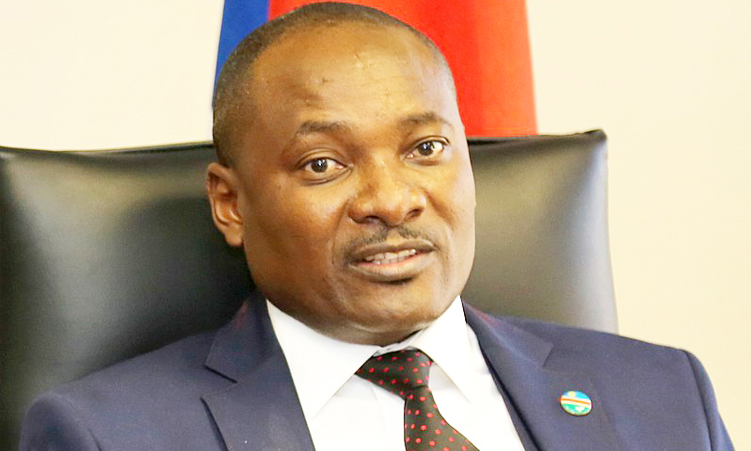How Swartbooi reconciled with Geingob on his sickbed
Two weeks before president Hage Geingob took his last breath, one of his fiercest political critics visited him on his sickbed and gave him a long hug.
The visit was both emotional and jovial – a look back at how far the two men have come.
For a moment, Bernadus Swartbooi, the leader of the Landless People’s Movement (LPM), had forgotten this was the same Geingob whom he had a heated argument with in parliament in 2020.
That afternoon, the late president famously scolded him: “I’m older than your mother . . . address me properly!”
This seemed like a reminder by the elder statesman to the younger man to respect him as he presented his state of the nation address with interruptions from Swartbooi.
The rebuke signalled the tension between the two politicians and has been reproduced through memes on social media.
Tempers flared and fingers were pointed in parliament between the two as Namibians watched them battle it out on national television.
In one session, things reached boiling point, with Swartbooi and his deputy, Henny Seibeb, being removed from parliament as the president’s security personnel feared physical violence could ensue.

A LIFE WELL LIVED
Swartbooi yesterday said he was relieved that he and Geingob were given the chance to reminisce and laugh at all that has transpired between them.
Their reconciliation took place privately at Geingob’s residence in Windhoek a few days before the late president left for the United States for novel cancer treatment.
He was not aware that Geingob was critically ill until minister of defence and veterans affairs Frans Kapofi urged him to pay the president a visit.
“I texted Kapofi to say “Happy New Year”. He texted me back, saying “you must go to Geingob”. That was in his WhatsApp message, saying he was not well and Geingob would appreciate it.
“I thought coming from Kapofi, matters must be serious. So I sent Geingob a WhatsApp message, saying I need to see you . . . and he said: Today may not be possible, but come tomorrow at 10h00, and I went with my wife,” Swartbooi said.
“We spent an hour talking and laughing, and we were collectively feeling some sort of relief. Here was this man undergoing treatment, and we were able to share some jokes, laughter, and I said: Whether we liked you or not, we all agree that you have lived your life freely and the way you wanted it. He was laughing, the typical Hage laughter,” he said.
Swartbooi described his relationship with Geingob as “fairly confrontational and contentious, but always reconciliatory”.
‘LOOK AT WHAT WE’VE BEEN THROUGH’
Swartbooi said the late president deeply appreciated the attention and care he received from ordinary people and world leaders after his cancer diagnosis was made public.
“He would say and laugh: ‘Imagine me, a man born under a tree . . . but these people from the United States and elsewhere are calling me to help me and offer words of comfort. I’m popular, Swartbooi, I’m telling you I’m popular,’” he said.
Swartbooi said the president recalled their journey and said: “Look at what you and I have been through. It’s been all over, but here you are in my house.We are talking. We are laughing. Life is complicated, yet simple.”
Swartbooi said he greeted the former president with a hug.
“I hugged him profoundly and said ‘Go well and come back well’.”
FROM MINISTER TO OPPOSITION
Geingob fired Swartbooi from his position as deputy minister of lands and resettlement in 2016 for refusing to apologise for comments he made to then lands minister Utoni Nujoma.
Prior to this, Swartbooi served as the governor of the //Kharas region.
In a matter of days, protests in solidarity with Swartbooi were held in Windhoek and at Keetmanshoop, demanding that Nujoma be fired, and that ancestral land claims, genocide reparations and a just resettlement policy are prioritised.
Swartbooi went on to found the LPM.
He said Geingob left him with these words: “We should never write off each other or anyone. Never do that in your life. You may argue here, but then you meet each other at a different point.”
“I thought that’s something I’m going to take along, because that for me is wisdom from an old man who was saying you are in politics, but also on a personal level never write off anyone permanently. Never ever do that,” he said.
This seems to have been the common factor in every fall-out Geingob had, including with Theo-Ben Gurirab and Hidipo Hamutenya.
OLIVE BRANCH
Kapofi yesterday said Geingob could not live in perpetual animosity with others.
“Geingob was a human being with feelings, whom I will miss a lot personally. He had his elasticity as well. Reaching out, reaching out,” he said.
Kapofi said Geingob asked him to reach out to both Hamutenya and Gurirab to restore their relationship. The late president and Gurirab fell out in 2002 when then president Sam Nujoma demoted Geingob as prime minister and replaced him with Gurirab.
Hamutenya’s fallout with Swapo started in 2004, when he declared his aspirations to run for the party’s president. Then Swapo president and founding president Sam Nujoma did not support his nomination, and on the eve of the extraordinary congress in 2004, sacked him as foreign affairs minister.
Hamutenya went on to form the Rally for Democracy and Progress, leaving him and Geingob at arm’s length politically.
“Geingob wanted the meeting to happen, but he was doubting if they would agree to it.
“It was one of the most difficult tasks my president had ever assigned me to undertake, and I could not refuse, because I was given a job to do.
“So, I started by first reaching out to Gurirab, and as you all would remember, Gurirab was a very smooth and easygoing guy. He openly agreed to the idea, and that made my next step easy.
“He was eager and ready to meet with his friend Geingob,” Kapofi said.
Kapofi said he did not know how to approach Hamutenya as he was reportedly adamant that he wanted nothing to do with Geingob at the time.
“They met on the night of 8 July 2015 for a light dinner at Geingob’s residence, an encounter both Hamutenya and Gurirab at the time described as a ‘trip down memory lane, a profound moment of friendship and a restoration of a lifetime bond’,” Kapofi said.

MORE TRIBUTES
Minister of environment, forestry and tourism Pohamba Shifeta remembers Geingob as a leader, mentor, philanthropist and a person of inclusivity.
Shifeta this week said Geingob understood democracy, and after 2014’s elections, where he emerged as president, reached out to top leaders like Pendukeni Ivula-Ithana and others to reunite Swapo and the nation.
Academic Hoze Riruako says Geingob upheld institutions and the rule of law.
“I think this comes from his brief stint at the United Nations. He looked at how the systems were set up there and how they worked,” he says.
Riruako says Namibia’s independence was facilitated by several countries, yet they departed immediately after independence and left the country to establish its own governing structures.
“Everything was left to the then young Hage to set up the systems, the institutions and processes that would make sure Namibia was able to govern itself,” he says.
Despite this, Geingob faced challenges upon his Presidency in 2015, noting that many ethnic groups in the country were hesitant about having a Damara president in office, Riruako says.
“This is one thing that hounded Hage from the beginning,” he says.
Riruako says Swapo failed to shield Geingob during the early days of his Presidency, when tribal sentiments were heightened.
“If there was anything in which Swapo failed, it was to protect Hage. For the first time in Namibian history, we had a president at whom anybody could throw any form of attack without reservation,” he says.
He praises Geingob for his stance on free speech, allowing the opposition and the media, to freely express themselves.
“But he also suffered from his own creation, because it was the same opposition that he had given so much freedom to speak out, who used that freedom to attack him like no other president in our history.
“But he never swayed, he encouraged that until the last day of his life,” Riruako says.
He says Geingob also attempted to combat corruption with the introduction of lifestyle audits.
“That again was met with so much opposition. Many used that to attack the president,” he says.
Stay informed with The Namibian – your source for credible journalism. Get in-depth reporting and opinions for
only N$85 a month. Invest in journalism, invest in democracy –
Subscribe Now!






